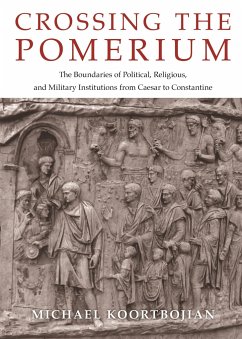"The Romans' early establishment of the sanctity of their city and the desire to protect it -- from not only the ravages of military conflict beyond its confines but the dangers of authoritarian rule at home -- took a variety of forms, legal, political, and military. These were codified in social practices, and thus established behaviors and rituals that, as they set these practices in the public eye, served as a continuing self-justification of Rome's growing dominance in the Mediterranean world. Koortbojian examines the transformation of Rome from Caesar to Constantine from several different points of view to reveal the primordial distinction between matters civic and military, and how the 'crossing of the pomerium,' the evanescent boundary that divided them, provided the crux of a historical interpretation of distinctly Roman endeavors. Koortbojian sets the background and then expands upon the long-vexed problem of the presence of men at arms in the city of Rome; long-standing legal and political practices that were adapted in the face of new military engagements and the crisis of civil war; and how Roman commanders attended to established religious practices while on campaign, and how those practices mirrored traditional customs and inverted the manner of their performance so as to acknowledge a profound Roman distinction between civic and military acts. As a whole, the book demonstrates how certain fundamental principles of law, politics, and military life -- and the practices that followed from them -- were interwoven in a narrative of continuity and change across three centuries of Roman imperial rule"
Hinweis: Dieser Artikel kann nur an eine deutsche Lieferadresse ausgeliefert werden.
Hinweis: Dieser Artikel kann nur an eine deutsche Lieferadresse ausgeliefert werden.








